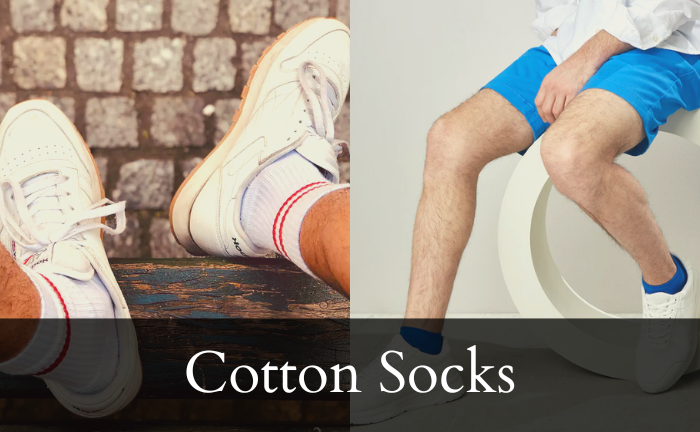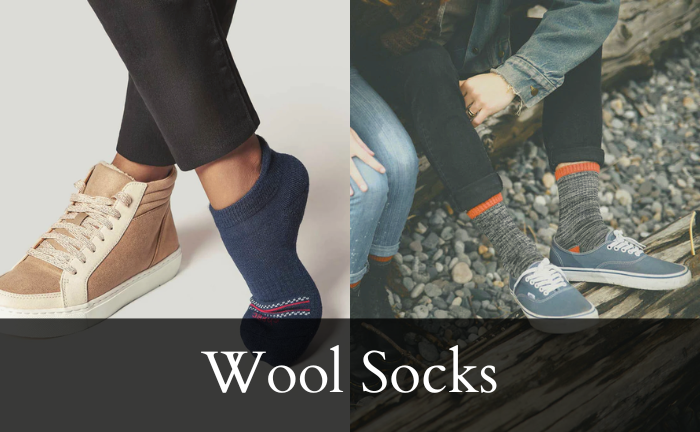When choosing socks, the material is a critical factor to consider. Not only does it affect the overall comfort and fit of your socks, but it also affects how long they last. Some materials are more durable than others, so they can withstand more wear and tear over time.
The sock materials that are more likely to last longest are given below.
- Cotton socks
- Wool socks
- Nylon socks
- Polyester socks
In this blog, you’ll fetch the different sock materials available and which ones are the most long-lasting.
Cotton Socks

Cotton is a popular sock material because it’s breathable and comfortable. Let’s have a look at the pros and cons of cotton socks.
Pros of Cotton Socks
- Comfort: Cotton is a soft and breathable material, which makes it comfortable to wear. It can help to keep your feet cool and dry, making it an excellent choice for warm weather.
- Durability: Cotton is a strong and durable material, so cotton socks can last a long time if cared for properly. They are less likely to develop holes or wear out quicker than other socks.
- Versatility: Cotton socks come in various styles, colors, and designs. They can be worn for any occasion, from casual outings to formal events.
- Affordable: Cotton socks are generally cheaper than socks made from other materials, such as wool or silk. This makes them an excellent choice for people on a budget.
Cons of Cotton Socks
- Absorption: While cotton is a breathable material, it is ineffective at wicking away moisture. Cotton socks can become damp and uncomfortable if your feet sweat excessively.
- Shrinkage: Cotton socks can shrink when washed in hot water or dried at high temperatures. This can lead to a tighter fit and decreased comfort.
- Allergies: Some people may be allergic to cotton or the chemicals used to produce cotton socks. This can lead to skin irritation or other allergic reactions.
- Fading: Cotton socks can fade over time, especially if exposed to sunlight or washed frequently. This can make them look worn out and less attractive.
Wool Socks

Wool socks are an excellent option for cold weather or outdoor activities. Here are the pros and cons of wool socks.
Pros of Wool Socks
- Warmth: Wool is a natural insulator that helps retain heat and warm your feet in cold temperatures.
- Moisture-wicking: Wool fibers are fantastic at wicking away moisture, which helps to keep your feet dry and prevents odor-causing bacteria from developing.
- Durability: Wool socks are known for their durability, as the fibers are solid and resistant to wear and tear.
- Comfort: Wool socks are soft and comfortable, as the fibers are gentle on your skin and don’t cause irritation or itching.
Cons of Wool Socks
- Cost: Wool socks can be more expensive than others, as wool is a premium material.
- Itchiness: Although wool is generally gentle on the skin, some people may find it itchy or irritating, particularly if they have sensitive skin.
- Maintenance: Wool socks require special care when washing, as they can shrink or become misshapen if not appropriately handled.
- Overheating: In warmer temperatures, wool socks may cause your feet to overheat, which can be uncomfortable.
Nylon Socks
Nylon is a synthetic material that’s commonly used in athletic socks. Let’s move along and explore the pros and cons of nylon socks.
Pros of Nylon Socks
- Moisture-wicking: Nylon is a synthetic fiber known for its moisture-wicking properties. This means that it can absorb moisture from your feet and transfer it to the outer surface of the sock, where it can evaporate.
- Durable: Nylon is a solid and durable material, which makes it ideal for socks. Nylon socks are less likely to develop holes or wear out quickly, even after repeated use and washing.
- Easy to care for Nylon socks are easy to care for and can be machine-washed and dried without any special treatment. They also retain their shape well, even after multiple washing items.
- Comfortable: Nylon socks are lightweight and have a smooth texture, which makes them comfortable to wear for extended periods. They also tend to fit snugly without being too tight, which can help prevent blisters and other foot injuries.
Cons of Nylon Socks
- Not breathable: While nylon socks are excellent at wicking away moisture, they are not very breathable. This means they may not be the best choice for hot, humid weather or people with sweaty feet.
- May cause skin irritation: Some people may be allergic to nylon or may experience skin irritation from wearing nylon socks. If you have sensitive skin, it’s essential to test a small area before wearing nylon socks for an extended time.
- Not eco-friendly: Nylon is a synthetic material that is not biodegradable, which means that nylon socks can contribute to environmental pollution when they are discarded.
- Not as soft as natural fibers: While nylon socks are comfortable to wear, they are not as smooth as socks made from natural fibers like cotton or wool. This may be a consideration for people with sensitive skin or who prefer the feel of natural fibers.
Related: What Kind of Socks Are Best For Feet? Know Now!
Polyester Socks
Polyester is another synthetic material that’s often used in socks. Polyester socks are a popular choice due to their affordability and durability. Here are the advantages and disadvantages of polyester socks.
Pros of Polyester Socks
- Affordable: One of the most significant advantages of polyester socks is that they are relatively inexpensive, making them an accessible option for many people.
- Durable: Polyester is a strong and durable material, which means that polyester socks can last for a long time with proper care.
- Quick-Drying: Polyester is a moisture-wicking material that can quickly absorb sweat and dry quickly, making it an ideal choice for athletic activities.
- Easy to Clean: Polyester socks are easy to clean and maintain. They can be machine washed and dried without shrinking or losing their shape.
Cons of Polyester Socks
- Poor Breathability: Polyester socks are not as breathable as other materials such as cotton or wool. This means they can trap moisture, leading to sweaty feet and an unpleasant odor.
- Less Comfortable: Polyester socks can be less comfortable than other materials due to their lack of breathability and tendency to cause irritation or itching.
- Static Electricity: Polyester is known to generate static electricity, which can lead to discomfort and irritation for some wearers.
- Environmental Impact: Polyester is not biodegradable and takes a long time to decompose, making it an unsustainable choice for those concerned about the environment.
Related: Should We Wear Socks With Casual Shoes?
Conclusion
When choosing the most long-lasting sock material, there are a few options to consider. Wool, nylon, and polyester are very durable materials that can withstand a lot of wear and tear without showing signs of damage.
However, if you’re looking for a more comfortable and sustainable option, bamboo socks may be the way to go. Ultimately, the best sock material for you will depend on your specific needs and preferences.
Consider factors like comfort, durability, and sustainability when making your decision.
